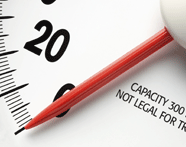Your Pregnancy Weight Gain Plan

What’s right for you
Just as there’s no such thing as “one size fits all” pantyhose (at best, they’re “one size fits some”!), there’s no such thing as a “one size fits all” recommendation for weight gain during pregnancy. The amount of weight that you need to gain is determined by your pre-pregnancy weight. If you are underweight (your body mass index is less than 20), you should aim for a weight gain of 28 to 40 lbs. (12.5 to 18 kg). If you are at a healthy weight (your body mass index is between 20 and 27), you should aim for a weight gain of 25 to 35 lbs. (11.5 to 16 kg). If you are overweight (your body mass index is greater than 27), you should aim for a weight gain of 15 to 25 lbs. (7.0 to 11.5 kg). While it’s tempting to use pregnancy as the best excuse ever for overindulging (to pretend that the other person you’re eating for is a 250 lb. trucker rather than a 1 lb. fetus!), it’s healthier for you and your baby to keep your weight gain within the healthy range. Besides, you can’t fool Mother Nature forever. At the end of the day, you’ll be forced to confront those less-than-welcome pregnancy “souvenirs” on your hips and thighs.
The truth about “eating for two”
According to Toronto dietitian Leslie Beck, author of Leslie Beck’s Nutrition Guide for Women: Managing Your Health with Diet, Vitamins, Minerals and Herbs, you’ll find it easier to keep your weight within the healthy range if you go slow when it comes to increasing your calorie intake. Your body only needs an extra 100 calories per day during the first trimester (the equivalent of an extra piece of fruit) and an extra 300 calories per day during the second and third trimesters (the equivalent of an extra piece of fruit and an extra grain serving or two.
More important than the quantity of calories you’re taking in or the number on the scale, however, is the quality of the food you’re eating. Rather than succumbing to your cravings for sweet or salty, high-fat foods – the types of foods pregnant women are most likely to crave, according to Ottawa Obstetrician Andree Gruslin – you should try to choose high-quality foods that are rich in calcium, vitamin D, folic acid, iron, essential fatty acids and other important nutrients – such as milk, cheese, yogurt, leafy green vegetables, broccoli, beans, wheat germ, meat, eggs and whole grains. (That’s not to say that foods like potato chips and chocolate are totally forbidden, of course! Where is it written that pregnancy has to be a nine-month-long exercise in deprivation?)
If you find you’re gaining weight more quickly than you’d like – either because you’re snacking to avoid nausea or because you’re ravenously hungry – don’t hit the panic button. Simply start choosing lower-calorie foods from each of the food groups. That way, your body will be getting the nutrients it needs to grow a healthy baby, and you’ll be able to reduce your total calorie hit at the same time.
Bon appetite!
Ann Douglas is an award-winning writer and author of numerous books about pregnancy and parenting including the newly published Sleep Solutions for Your Baby, Toddler, and Preschooler and Mealtime Solutions for Your Baby, Toddler and Preschooler. Visit www.having-a-baby.com




